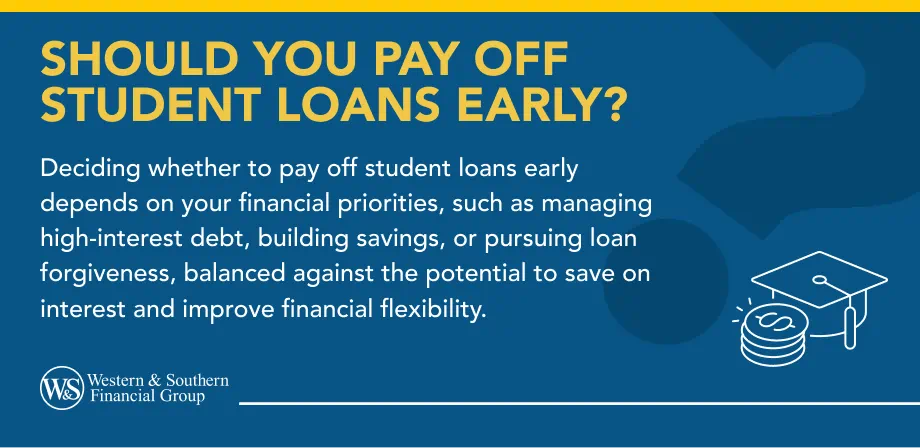

Key Takeaways
- Pay at least the minimum required payment on your student loans to avoid late fees and credit damage. If you can pay more, target the extra funds at the principal balance.
- Consider paying off higher-interest debt like credit cards first before putting extra funds toward lower-interest student loans.
- Build up a 3-6 month emergency fund before prioritizing extra student loan payments.
- Don't miss out on any student loan forgiveness programs you may qualify for by paying off loans early.
- Weigh paying off student loans against other financial goals like retirement savings, saving for a house, etc. The right choice depends on your full financial situation.
If you currently have student loans, it's natural to want to pay off everything off as soon as possible, so you no longer have that debt hanging over your head. But while there are benefits to paying off student loans quickly, it's important to balance this goal against your other financial priorities.
So, when should you pay off student loans early, and when should you wait? Here's what to consider.
Understanding Student Loan Payments
Your loan servicer will set a monthly payment for your student loans. You must pay the minimum amount required, otherwise, the servicer might charge late payment fees or report your missed payment to the credit rating agencies, which can hurt your credit score.
Maximizing Your Debt Repayment
If you have the funds, you have the option to pay more than the minimum toward your student loans, which can help you pay down the debt faster. If you pay more than the minimum, it's a good idea to make sure the extra money applies to the principal balance.
Qualifying for Future Loans and Minimizing Interest Costs
In turn, having less debt may make it easier to qualify for other loans in the future, such as a mortgage. In addition, since the lender is charging interest on your unpaid balance, paying off student loans quickly means you'll owe less in total interest over the life of your student loans.
Weighing the Opportunity Cost
As you can see, there can be considerable advantages to paying off student loans quickly. However, paying your student loans likely isn't your only financial goal. Putting extra money toward your loans means you have less money for paying off other debt, making a house down payment, building your emergency fund or saving for retirement.
This is known as an opportunity cost: When you spend money on student loans, you may not have it for your other goals. That's why you may want to consider the big picture to decide where that money could give you the largest benefit.
Weigh all your financial goals before committing to early loan repayment. Get My Free Financial Review
When Should I Wait to Pay off My Student Loans?
You Have Other High-Interest Debt
The interest rate on student loans tends to be lower than interest on other debts such as credit cards and unsecured personal loans. If you are also carrying these debts, you likely would be better off paying them first because they are costing you more in interest.
For example, let's say you have $10,000 in credit card debt with an interest rate of 15%, and $10,000 in student loans with an interest rate of 5%. The credit card interest amounts to roughly $1,500 a year, versus only $500 per year on the student loans - so you could save more by paying off the credit card first.
You're Still Building Your Emergency Fund
A general rule of thumb is to save between three and six months' worth of living expenses in your emergency fund to help you manage a job loss, a sudden illness or a surprise bill, such as repairs for your car. Put extra money in an emergency account to help protect against a financial emergency.
You're Eligible for Student Loan Forgiveness
The federal government offers several student loan forgiveness programs for certain careers, such as education, military service, or jobs in the nonprofit and government sectors.1 If you are eligible for loan forgiveness, you may be better off waiting until the loans are forgiven rather than paying extra now.
You Have Other Upcoming Financial Goals
Whether it's buying a new house, starting a business or paying for an upcoming wedding, if you have other major financial goals, you'll need to save money for these as well. That means not everything can go toward your loans.
You Aren't Saving Enough for Retirement
The earlier you start saving for retirement, the more time you have to grow your savings, so make sure not to delay this goal to focus only on your loans. In particular, if you have a 401(k) match at work, aim to save at least enough to get the full match. This is free money for your retirement, so do your best to take full advantage.
Calculator
Not sure if you should pay off student loans early? Try our Debt-to-Income Ratio Calculator to see where you stand.
When Should I Pay off My Student Loans Early?
You Already Have Plenty in Savings and No High-Interest Debt
If you're in a strong financial position, with no high-interest debt and a decent emergency fund, then you could have the resources necessary to pay more toward your loans.
You Have No Opportunity for Student Loan Forgiveness
Since you'll need to pay your loans in full eventually, there's more motivation to pay off early.
You're Saving Enough for Retirement
If you're getting your full 401(k) match and feel confident you're on-track for your retirement, then you can feel confident targeting other financial goals, such as your loans.
You Don't Have Any Other Upcoming Financial Goals
With no other urgent financial priorities, you can more easily spare the money to pay off your loans. Deciding if you should pay off student loans early (or not) is something to consider along with all your other financial goals.
Calculator
Wondering if you should pay off student loans early or focus elsewhere? Try our Pay Off Debt or Invest Calculator to see what makes sense for you.
The Bottom Line
For more help with this big picture view, consider speaking with a financial representative. They can help you with this decision while also making sure you follow strategies for managing student loan debt.
Decide if early student loan repayment aligns with your goals. Get My Free Financial Review
Frequently Asked Questions
Should I pay off student loans early or invest instead?
Can paying off student loans early affect tax benefits?
Can refinancing help me pay off student loans early?
Sources
- Student Loan Forgiveness (and Other Ways the Government Can Help You Repay Your Loans). https://studentaid.gov/articles/student-loan-forgiveness/.












